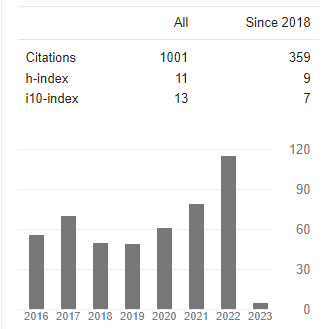Comparative Study of Self Esteem among Male and Female Students from Fit India Movement Organised by Savitribai Phue Pune University
Abstract
Abstract
Self-esteem is an acquire set of beliefs about the ‘Self’ and it is the largest determinant of behaviour. Purpose of this study is to find if gender has any influence on Self-Esteem of current participants of Fit India Movement organised by Department of Physical Education from Savitribai Phule Pune University. This study was carried out on 15 male and 15 female students (n=30) age between 20-30 years. Data was collected by using Rosenberg Self-Esteem 4 point Likert scale in form of Google form. Analysis of data was Quantitative, Independent sample t test was computed to compare Self-Esteem between both the genders. Findings show that there is no significant difference of Self-Esteem among male and female students (P=0.109). Therefore conclusion states that gender has no influence on Self-Esteem on students of Fit India Movement organised by Savitribai Phule Pune University.
Downloads
References
Ali, J. (2011, July). A Comparative Study of Self-Esteem between Male and Female Fencers of Manipur. International Journal of Health, physical Education and Computer Science in Sports, 3, 15.
Mandeep Singh Nathial, Analysis of set shot in basketball in relation with time to perform the course and displacement of center of gravity, American Journal of Sports Science, Vol.2 Issue.5 pp: 122-126 (2014). Retrieved from https://www.sciencepublishinggroup.com/journal/paperinfo.aspx?journalid=155&doi=10.11648/j.ajss.20140205.13
Mandeep Singh (2010). Evaluation And Improvement Of Sports Techniques Through Biomechanical Updated Analyzing Technology, University News, Journal of Higher Education Association of Indian Universities, Association of Indian Universities, Vol:48:Issue.05;2010 Pp45-57, 2010
Mandeep Singh Nathial, A Study of Adjustment and Emotional Intelligence of University Coaches in India, American Journal of Applied Psychology. Volume 3, Issue 6, November 2014 , pp. 122-126. doi: 10.11648/j.ajap.20140306.11
Mandeep Singh, Balbinder Singh, “Analysis of Psychosocial Factors Promoting Doping In Sport: A Study for Promoting Preventive Measures to Curtail Adoption of Doping”, Journal of Positive School Psychology, 2022, Vol. 6, No. 4, 10193–10203, http://journalppw.com. https://journalppw.com/index.php/jpsp/article/view/6344/4183
Rosenberg, M. (1965). Society and The Adolescent Self Image. Princeton University Press.
John W. Best & James V. Kahn. (2006). Research in Education. New Jersey: Pearson Education Inc.
Robert Joseph, H. R. (1992). Gender and Self Esteem. Journal of personality and social Psychology, 391.
Kendler, K. S. (1998). A Population Based Twin Study of Self Esteem and Gender . Psychological Medicine, 1403-1409.
Levy, P. E. (1991). Effect of Self Esteem and gender on Goal Choice. Journal of Organizational Behaviour , 529-541.
Singh, M., Kour, R., & Kour, A. (2022). A collaborative diversified investigation of respective responses of sports person coaches and organizations on criminalization of doping.International Journal of Health Sciences,6(S3), 11295–11310. https://doi.org/10.53730/ijhs.v6nS3.8641
Singh, M., Kour, R., & Kour, A. (2022). A collaborative diversified investigation of respective responses of sports person coaches and organizations on criminalization of doping. International Journal of Health Sciences, 6(S3). https://doi.org/10.53730/ijhs.v6nS3.8641















